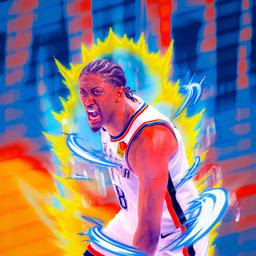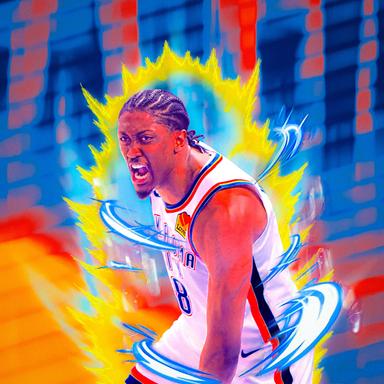One has to imagine Kevin Durant, slouched in the biggest Eames chair imaginable, phone inches from his face, letting out an incredulous sigh as the tweets and trade rumors about him intensify—amid what has been one of the most tactically significant and stylistically beautiful NBA Finals of at least the past decade.
In this Oklahoma City Thunder–Indiana Pacers series, a clear vision of basketball’s future has come down to us. Roster depth and adaptability; modular defensive alignments powered by continuity rather than true anchors; stars and role players who can get into the paint regularly, stimulating an offensive flow reminiscent of the chocolate fountain at a Golden Corral. These Finals have offered equipment and preparation for the next era of the NBA. But with clarity comes responsibility. It’s easier to lie in the slop, to traffic in the murky waters of rumor and insinuation, to dwell on improbabilities without consequence. Thunder-Pacers has been the kind of pure hoops that Durant has chased his entire life; it’s a series that has operated with the kind of flow that KD risked his reputation to experience nearly a decade ago, in his departure from Oklahoma City to Golden State. That he’d play a major role in detracting from such a monument to basketball is mildly ironic.
Durant’s entire body of work builds off the premise that the purity of basketball speaks for itself, in spite of all the surrounding noise. But indeed, the steady, foreboding thrum occupying the dead space between Finals games has focused on speculation of KD’s next (next, next, next) chapter. The Finals are great, sure, but Durant knows that NBA intrigue runs deeper (or shallower, depending on who you ask) than that. He knows because he’s spent the better part of the past decade embedding himself with the modern fan’s psyche on their home turf. “It’s the dramatics they want,” he once wrote. He knows, because he’s spent the bulk of the past 10 years defending his decision to leave OKC both on and off the court—and he may go the rest of his days defending himself against an ideal version of him that will only ever exist in the imagination of betrayed fans. There might not be another player who has been able to compartmentalize his pure love for the game—from all sides—as well as Durant has. He is arguably the greatest offensive talent the game has ever seen; he is also as fluent, provocative, and gut-punchingly effective a reply guy on social media as any Bored Ape shill. He is a titan who has deigned to show how conventionally human he is. He’s both celebrated and reviled for it. And, love him or hate him, his next (and likely final) chapter could have a lot more meaning than the past two: It could give shape to a newfound contender.
With the Thunder just one win away from basketball immortality, the offseason pendulum will quickly swing over to the league’s next inevitability: the Kevin Durant sweepstakes, where leaks from Suns owner Mat Ishbia’s camp and Durant’s agent and business partner Rich Kleiman have pinged back and forth nearly as frenetically as the Finals series itself. We know Durant will be dealt soon. We just don’t know where.
Basketball’s preeminent wayfaring stranger reportedly has a trio of teams he’s most interested in and committed to the idea of joining: the Miami Heat, the Houston Rockets, and the San Antonio Spurs. KD would probably hoop in the tundra if he had to, but it’s clear that he’d prefer some sunshine, and he’d prefer for his probable, eventual $120-plus million extension to be exempt from state income tax. (Sorry, Minnesota. Not even Ant’s charm is enough to sway the man.) Fair enough! It’s good to know what you want and make it known when you’re about to turn 37. But in this twilight period of player empowerment, wishes and requests can be deferred. Damian Lillard didn’t land in his preferred destination, nor did Jimmy Butler. Though it’s easier to focus on the wants of the player at the center of it all, transactions often come down to urgency from an organizational perspective. How bad do you want it, but on the cap sheet rather than the hardwood. The Orlando Magic traded away four first-round picks for Desmond Bane this past weekend because any possible version of success hinges on having a bona fide sharpshooting playmaker like Bane in their lineups. That’s the energy a team acquiring Durant ought to approach the opportunity with, but such a team might not exist. Such is the reality for an undeniably great player who is also undeniably getting close to 40 and has averaged less than 55 games played per season this decade.
The concept of trading for Durant as a final piece to a contending puzzle hinges on an NBA anomaly—but isn’t that what he’s proved himself to be? Durant’s offensive consistency in his 30s has been nothing short of remarkable. In a sense, KD’s game is defined by a stillness, something my colleague Brian Phillips once wrote about Roger Federer 10 years ago. Not stillness of mind—because we all know that Durant’s mind is whirring and restless, given that his second-favorite thing to do in the world is suffer fools on social media—but stillness of ability.
Most nights, he’s still operating as a top-10-caliber player. He still gets into his midrange pull-up with the ease of his youth. He still has the length and mobility to enrich a team defense in ways you wouldn’t expect. He’s still one of the most devastating scorers the game has ever seen from anywhere on the court. Healthy or not, he’s been a guaranteed 26-6-4 on a nightly basis since departing Golden State, with percentages dangerously close to 50-40-90 splits across the past six seasons combined. KD has pushed the event horizon of a superstar’s expected age cliff as far as any NBA player in history outside of LeBron James. As an individual player, his statistical inevitability is arguably the most impressive feat of his career; call it the refinement of his decline. Still, Durant would be the first to tell you, basketball is a team sport. He’s not playing tennis.
Durant hasn’t made it past the second round since leaving Golden State. He is a strange vessel of greatness obfuscated by shifting tides leaguewide. Where his time with the Warriors was the pinnacle of the superteam thesis, his past six seasons have reflected the failed state of the late-stage superteam era, and how star-heavy roster imbalance has a near-certain toppling effect given the conditions of the current collective bargaining agreement.
Durant is venturing into uncharted waters as a player as he approaches 37, but in a way, he will enter the fray with a level of clarity that has eluded him in his previous stops. There is no longer any pretense of building a team around Durant, managing the egos of co-headliners for the sake of continuity, or wondering whose team is this? Durant will soon be joining a team purely as a hired gun, a state of being that KD has inhabited for a while now, though the sheer transactionality of it all feels different this time.
If there is a clean fit anywhere in the league, it lies in Houston, where the Rockets’ architect, Rafael Stone, has been steadfast over the years in affirming a slow-and-steady team-building approach focused on in-house talent development and a longer view for any potential contending windows. But the best teams create championship windows through consolidation, making league-shifting trades by identifying the one piece missing all along. The Bucks don’t win a ring without trading for Jrue Holiday, just like the Nuggets don’t fully realize Nikola Jokic’s peak without trading for Aaron Gordon. Houston’s lack of a reliable, efficient fourth-quarter scorer was the most obvious weakness among playoff teams in the upper echelon of the standings; it played out exactly how everyone expected in the first round against the Warriors. If Durant’s Macrobian career remains consistent even as he creeps closer to 40, there might not be a more perfect player to address the Rockets’ glaring void. Surrounded by young, bloodthirsty condors up and down the roster, Durant would be insulated from overextending on defense, while contributing as a helper in all the ways that have gone under the radar over the years. And with a relatively clean cap sheet plus plenty of young talent and future assets, even a lowball bid from the Rockets would likely clear most offers leaguewide.
Unless a dark horse emerges from the shadows, Durant’s fate appears tied to the leverage play between Houston and Phoenix. The Spurs don’t really need to take any shortcuts with Victor Wembanyama, and the Heat don’t really have the assets. The Rockets, of course, have possession of the Suns’ 2025 (no. 10 in this month’s draft) and 2027 first-round picks, unprotected, and the Suns would love to regain control of at least one of those assets. According to The Athletic’s Kelly Iko, the Suns have “gradually lowered their asking price for Durant” since trade discussions resumed at the end of the regular season, but the Rockets hold all the cards at the table. Houston certainly isn’t obligated to return any picks. Nor does it need to acquire Durant—though it’d certainly be a lot cooler if it did.
There may always be a vocal majority of people who will never forgive Durant for leaving Oklahoma City and betraying the spirit of competition, I guess, but I can’t help but think about this final act as another chance at finding that flow he found in Golden State. You know, before things got weird and egos were bruised. Maybe there’s a situation forming for him to approximate those conditions again—a team where he can join an existing ecosystem and effectively notarize its standing in history simply by playing up to his standard. But this time, he can do it with the freedom of detachment. Durant’s next team will never truly be his, nor would he want it to be. In these waning years, the hope would be to find a team where he can effectively hoop in a vacuum, unbothered. A personal basketball Nomadland.
The longer you scroll through Durant’s Sisyphean Twitter feed, the more it becomes apparent that he’s never fully approached basketball as a zero-sum game; the goal is to win championships, of course, but there is power and wonder that lies in the subjectivity of greatness, of dominance, of style. Of late, he’s taken to the idea of basketball as performance art, as something to be interpreted however the beholder sees fit. Maybe it’s a bit of self-preservation, or maybe it’s a sign of transcendence. If, at the end of Durant’s long and turbulent journey toward a purer expression of basketball, he once again finds meaning in being the finishing touch to someone else’s masterpiece? Well, maybe it’d all be worth it.




